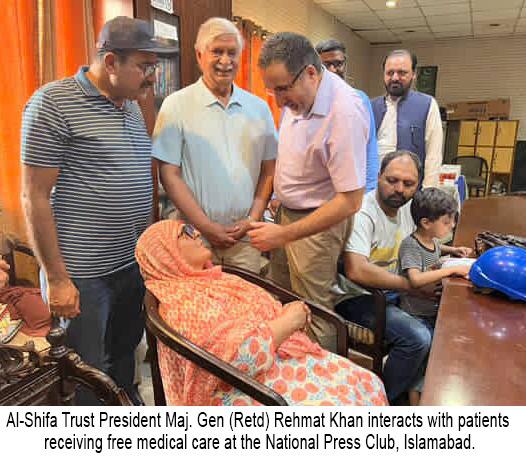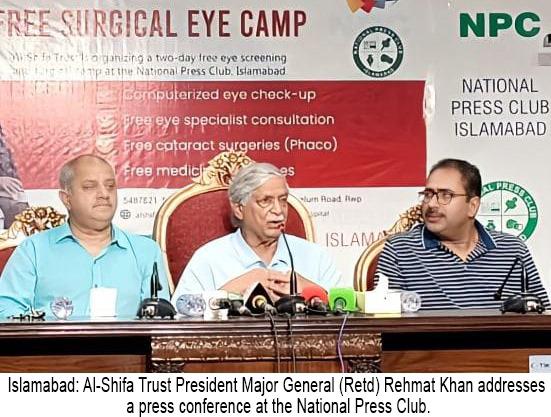Al-Shifa Trust emerges as national lifeline treating 1.8 million patients annually.
Tariq Khattak
Pakistan stands at the crossroads of a devastating public health emergency as nearly two million citizens face preventable blindness, with 80 percent of cases remaining entirely curable through proper intervention. This stark reality has positioned private healthcare initiatives as critical lifelines in addressing what amounts to a national crisis.
Major General (Retd) Rehmat Khan, President of Al-Shifa Trust, revealed these alarming figures during a comprehensive media briefing at the National Press Club on Sunday, underscoring the magnitude of Pakistan’s eye health challenge. The Trust’s response has been nothing short of extraordinary, treating more than 1.8 million patients last year alone, including 100,000 surgical procedures, with 83 percent receiving treatment at no cost.
“Every day we carry out about 450-500 surgical procedures,” Khan emphasized, highlighting the organization’s operational scale that has become indispensable to Pakistan’s healthcare landscape. The Trust performs approximately 1,000 corneal transplants annually, representing 50 percent of all such procedures conducted nationwide, while maintaining its distinction as the country’s only hospital chain providing free eye cancer treatment.

The healthcare network’s expansion continues with ambitious infrastructure development. A groundbreaking ceremony for Pakistan’s largest and most modern eye hospital in Lahore is scheduled for September 2025, with design oversight from an American architectural firm. This represents a significant milestone in the Trust’s evolution from its modest 1985 beginnings into Pakistan’s most comprehensive humanitarian eye care network.
The scope of Pakistan’s vision crisis extends far beyond surgical cases. Khan noted that an estimated 12.64 million people, 61 percent of whom are women, struggle with basic reading and close-up tasks due to limited access to simple reading glasses. This accessibility gap severely undermines education, employment opportunities, and overall quality of life across vast segments of the population.
Multiple factors contribute to this epidemic of preventable blindness. Refractive errors and diabetic retinopathy emerge as primary culprits, while poor hygiene practices, polluted environmental conditions, financial constraints, insufficient public awareness, inadequate medical facilities, and deep-rooted cultural barriers create a perfect storm of vision loss.
The Trust’s humanitarian mission transcends conventional healthcare delivery by eliminating economic barriers to treatment. Over three decades, daily patient capacity has grown from 25 to 5,000 individuals, demonstrating sustained commitment to expanding access. Recent technological investments have further enhanced service delivery, with the Chakwal hospital expansion dramatically increasing daily capacity from 150 to 650 patients, reflecting strategic adaptation to growing demand.
Looking ahead, Al-Shifa has set ambitious targets to double its service capacity to 2.5 million patients annually, including 120,000 surgeries, by 2028. This expansion strategy includes multiple facility developments currently underway. The Trust’s Haweli Lakha hospital nears completion, while the GB Hospital remains under construction with temporary operational arrangements already providing full treatment and surgical services.
Dr. Najam, General Manager of the Outreach Program, detailed the organization’s community-based approach to addressing geographical barriers. The outreach initiative extends eye care directly to underserved populations through strategic camp placements in remote areas. Last year alone, approximately 1,500 eye camps operated across all provinces, including AJK and GB, benefiting over 650,000 patients under the mission to “reach the unreached.”
Khan emphasized the critical balance between serving those who cannot afford treatment while engaging those with resources to support the mission. Through combining advanced medical technology with compassionate care delivery, Al-Shifa continues demonstrating that even the most challenging public health crises can be effectively addressed through proper dedication and community mobilization.
The Trust’s impact extends beyond patient statistics to professional community support. National Press Club officials informed Khan that hundreds of journalists have received treatment through Al-Shifa services, with dozens undergoing operations in state-of-the-art mobile clinics that also provide free glasses and medications, illustrating the organization’s comprehensive approach to community health support.
AST remarkable growth trajectory from a single facility to a national institution reflects both the severity of eye health crisis and the potential for private sector to fill critical gaps in public health infrastructure.

